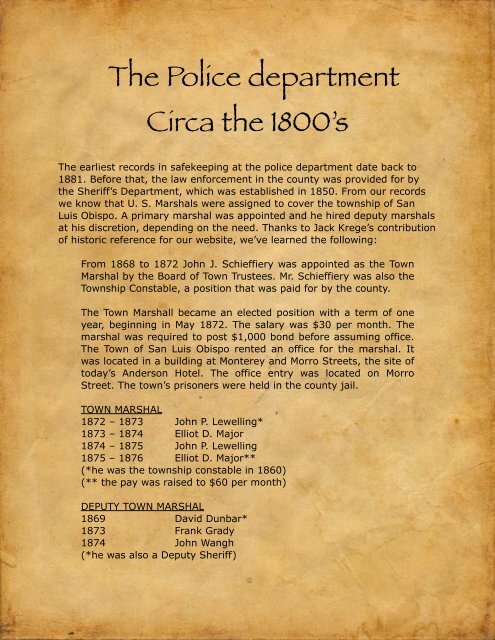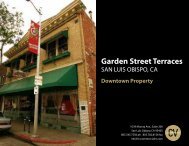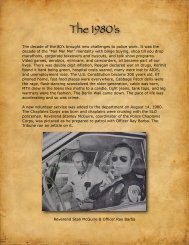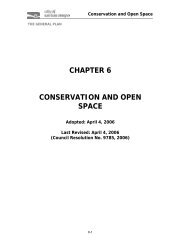The Police department Circa the 1800's - the City of San Luis Obispo
The Police department Circa the 1800's - the City of San Luis Obispo
The Police department Circa the 1800's - the City of San Luis Obispo
Create successful ePaper yourself
Turn your PDF publications into a flip-book with our unique Google optimized e-Paper software.
<strong>The</strong> <strong>Police</strong> <strong>department</strong><br />
<strong>Circa</strong> <strong>the</strong> 1800’s<br />
<strong>The</strong> earliest records in safekeeping at <strong>the</strong> police <strong>department</strong> date back to<br />
1881. Before that, <strong>the</strong> law enforcement in <strong>the</strong> county was provided for by<br />
<strong>the</strong> Sheriff’s Department, which was established in 1850. From our records<br />
we know that U. S. Marshals were assigned to cover <strong>the</strong> township <strong>of</strong> <strong>San</strong><br />
<strong>Luis</strong> <strong>Obispo</strong>. A primary marshal was appointed and he hired deputy marshals<br />
at his discretion, depending on <strong>the</strong> need. Thanks to Jack Krege’s contribution<br />
<strong>of</strong> historic reference for our website, we’ve learned <strong>the</strong> following:<br />
From 1868 to 1872 John J. Schieffiery was appointed as <strong>the</strong> Town<br />
Marshal by <strong>the</strong> Board <strong>of</strong> Town Trustees. Mr. Schieffiery was also <strong>the</strong><br />
Township Constable, a position that was paid for by <strong>the</strong> county.<br />
<strong>The</strong> Town Marshall became an elected position with a term <strong>of</strong> one<br />
year, beginning in May 1872. <strong>The</strong> salary was $30 per month. <strong>The</strong><br />
marshal was required to post $1,000 bond before assuming <strong>of</strong>fice.<br />
<strong>The</strong> Town <strong>of</strong> <strong>San</strong> <strong>Luis</strong> <strong>Obispo</strong> rented an <strong>of</strong>fice for <strong>the</strong> marshal. It<br />
was located in a building at Monterey and Morro Streets, <strong>the</strong> site <strong>of</strong><br />
today’s Anderson Hotel. <strong>The</strong> <strong>of</strong>fice entry was located on Morro<br />
Street. <strong>The</strong> town’s prisoners were held in <strong>the</strong> county jail.<br />
TOWN MARSHAL<br />
1872 – 1873 John P. Lewelling*<br />
1873 – 1874 Elliot D. Major<br />
1874 – 1875 John P. Lewelling<br />
1875 – 1876 Elliot D. Major**<br />
(*he was <strong>the</strong> township constable in 1860)<br />
(** <strong>the</strong> pay was raised to $60 per month)<br />
DEPUTY TOWN MARSHAL<br />
1869 David Dunbar*<br />
1873 Frank Grady<br />
1874 John Wangh<br />
(*he was also a Deputy Sheriff)
TOWN NIGHT WATCHMAN*<br />
1870 – 1872 W. M. Farmer<br />
1872 – 1874 F.F. Fine**<br />
1874 – 1876 Jacob Bump<br />
(* 9:00 PM to sunrise, 7 days a week)<br />
(** <strong>the</strong> pay was $30 per month)<br />
When <strong>the</strong> city was incorporated in 1876, <strong>the</strong> job titles became <strong>City</strong><br />
Marshal and <strong>Police</strong>man. <strong>The</strong> <strong>City</strong> Marshall’s <strong>of</strong>fice was on <strong>the</strong><br />
second floor <strong>of</strong> <strong>City</strong> Hall on Higuera Street when it opened in 1879.<br />
<strong>The</strong> <strong>City</strong> Jail was located on <strong>the</strong> first floor behind <strong>the</strong> area used by<br />
<strong>the</strong> Fire Department. <strong>The</strong> jail consisted <strong>of</strong> a shackle room and three<br />
cells. <strong>The</strong> entrance to <strong>the</strong> jail was reached by an alleyway on <strong>the</strong><br />
south side <strong>of</strong> <strong>the</strong> building.<br />
CITY MARSHAL<br />
1876 – August 1877 A. C. McLeod<br />
August 1877 – April 1878 Frank Grady*<br />
1878 – 1879 Jacob Bump<br />
1879 – 1881 George W. Robbins<br />
(*Appointed by State Governor <strong>of</strong>fice to fill vacated position<br />
POLICEMAN<br />
1876 Jacob Bump<br />
1877 Jacob Bump & John Dunbar<br />
1878 F. De La Guerra & Elliot D. Major<br />
1879 Frank Grady & Zenobia A. Pico<br />
1880 Frank Grady & T. Berger<br />
*****************<br />
Before 1850, and for some time after that, <strong>the</strong> communities formed vigilance<br />
committees to enforce order when criminal activity was serious. <strong>The</strong>se<br />
committees were made up <strong>of</strong> townspeople who lived in <strong>the</strong> community that<br />
was affected by <strong>the</strong> crimes. Each household joined toge<strong>the</strong>r to find <strong>the</strong><br />
persons responsible for <strong>the</strong> problems. Justice was swift—most instances <strong>of</strong><br />
this type were dealt with by a public hanging <strong>of</strong> <strong>the</strong> culprit. If a household<br />
was unwilling to help in <strong>the</strong> recovery <strong>of</strong> such lawbreakers, <strong>the</strong>y were no<br />
longer in <strong>the</strong> circle <strong>of</strong> protection and if <strong>the</strong>y had a problem in <strong>the</strong> future,<br />
<strong>the</strong>y were on <strong>the</strong>ir own.<br />
In one notorious case in 1848, a group <strong>of</strong> sailors from Monterey murdered<br />
<strong>the</strong> entire Read family in <strong>the</strong>ir home. Mr. Read had returned from mining in
<strong>the</strong> Sierra Nevada Mountains with several thousand dollars in gold. He was a<br />
very hospitable and talkative man who told <strong>of</strong> his adventures in <strong>the</strong> gold<br />
country and showed <strong>the</strong> sailors, who happened to be passing through, all <strong>the</strong><br />
gold he had brought back. <strong>The</strong> sailors requested to stay <strong>the</strong> night and Mr.<br />
Read graciously made <strong>the</strong>m feel welcome. In return for his hospitality, <strong>the</strong><br />
sailors murdered him, his wife, her nurse (she had just given birth), <strong>the</strong><br />
newborn infant, two children, and a manservant. When <strong>the</strong> crime was<br />
discovered, <strong>the</strong> vigilance committee tracked <strong>the</strong>m to a beach in Carpenteria<br />
and killed all who were involved in <strong>the</strong> murders. One <strong>of</strong> <strong>the</strong> vigilantes was<br />
killed and o<strong>the</strong>rs were wounded in <strong>the</strong> battle. One <strong>of</strong> <strong>the</strong> sailors plunged into<br />
<strong>the</strong> surf and tried to swim out to sea. A bullet was sent out to him and he<br />
went down, food for <strong>the</strong> sea monsters. <strong>The</strong> vigilance group was so incensed<br />
with <strong>the</strong> evil this group had committed that <strong>the</strong>y didn’t even afford <strong>the</strong>m a<br />
burial. <strong>The</strong>y left <strong>the</strong>m on <strong>the</strong> beach for <strong>the</strong> vultures and coyotes to take care<br />
<strong>of</strong>.<br />
***********<br />
As far back as 1881, when <strong>the</strong> marshals were serving <strong>the</strong> city, our<br />
<strong>department</strong> has preserved <strong>the</strong> <strong>Police</strong> Court Dockets, i.e., <strong>the</strong> arrest records<br />
and trial entries. <strong>The</strong> types <strong>of</strong> arrests are surprisingly similar to today’s<br />
<strong>of</strong>fenses:<br />
• <strong>The</strong> all time favorite, <strong>the</strong>n and now, is drunk and disorderly<br />
• Malicious mischief<br />
• Battery (one case noted a violin as <strong>the</strong> weapon)<br />
• Carrying a concealed weapon<br />
• Riding a horse on <strong>the</strong> sidewalk, driving a team on <strong>the</strong> sidewalk<br />
• Indecent exposure <strong>of</strong> person<br />
• Petit larceny, grand larceny, gambling<br />
• Drawing a knife on an <strong>of</strong>ficer<br />
• Under 18 in a saloon playing cards<br />
• Fast riding on streets, or bridge<br />
• Under 18 and being in a dance house<br />
• Passing a slingshot to a jail prisoner<br />
• Using obscene/vulgar language in <strong>the</strong> presence <strong>of</strong> ladies, an <strong>of</strong>ficer, or<br />
on a public street<br />
• Keeping a house <strong>of</strong> ill fame or visiting a house <strong>of</strong> ill fame (sometimes<br />
worded as keeping a disorderly house)<br />
• Operating an opium den or visiting an opium den<br />
• Embezzlement<br />
• Vagrancy and mooching<br />
• Enticing a minor female into a house <strong>of</strong> ill fame
• Rioting on <strong>the</strong> sidewalk<br />
• Loose stock on <strong>the</strong> streets<br />
• Refusal to work<br />
• Urinating on <strong>the</strong> street, making fires on <strong>the</strong> street<br />
• Violating Sunday laws (mostly by selling liquor out <strong>of</strong> a saloon)<br />
Some <strong>of</strong> <strong>the</strong> above sound familiar to <strong>of</strong>ficers serving today I’m sure. Fines or<br />
jail time were levied for all <strong>the</strong> above, most warranting a $5-$10 fine or five<br />
to ten days in jail—most definitely NOT <strong>the</strong> same as today!<br />
Five U.S. Marshals, May 15, 1895<br />
Photo by a local photographer whose last name was Arnold.<br />
<strong>The</strong>se are five <strong>of</strong> <strong>the</strong> marshals who served in <strong>the</strong> 1890’s. Pictured left to<br />
right: Jonathon Franklin Park, Fire Engineer for <strong>the</strong> SLOFD, his job included<br />
working as a policeman; Robert Henry Pruitt, policeman; James W. Cook,<br />
<strong>City</strong> Marshal 1894-1900; Ambrose A. Fox, mounted policeman, he rode <strong>the</strong><br />
police horse and was <strong>the</strong> Deputy Poundmaster; and James W. Crawford,<br />
policeman. <strong>The</strong>y were <strong>the</strong> complete force for <strong>the</strong> day. Dressed in <strong>the</strong> first<br />
uniforms <strong>of</strong> <strong>the</strong> <strong>Police</strong> Department, made by David P. Thurber, whose shop<br />
was at 718 Higuera. <strong>The</strong> uniform consisted <strong>of</strong> navy blue pants and a navy<br />
blue coast with brass buttons. A blue hat was also worn, each uniform cost<br />
$21. <strong>The</strong> city paid $7 toward <strong>the</strong> purchase and <strong>the</strong> employee paid <strong>the</strong> rest.
This picture was given to <strong>the</strong> Telegram courtesy <strong>of</strong> J. Pruitt. <strong>The</strong>ir pictures<br />
and <strong>the</strong> following stories involving <strong>the</strong> marshals have been sent to <strong>the</strong> U.S.<br />
Marshall Service and have been entered into <strong>the</strong> National Archives.<br />
Marshal Robert Pruitt<br />
This is what <strong>the</strong> well dressed policeman was wearing in <strong>the</strong> 1890’s. This<br />
picture <strong>of</strong> Robert Pruitt appeared in <strong>the</strong> Tribune courtesy <strong>of</strong> John Pruitt.<br />
For many years in <strong>the</strong> early 1880’s, Marshal Frank Grady served <strong>the</strong> city. He<br />
played an important part in <strong>the</strong> molding <strong>of</strong> <strong>the</strong> city’s law and order. He
figured time and again in <strong>the</strong> quelling <strong>of</strong> some desperado’s wild doings.<br />
According to an article in <strong>the</strong> Telegram <strong>of</strong> 1885, his quick draw and cool<br />
nerve saved his life. <strong>The</strong> article reads as follows:<br />
“Because Frank Grady arrested a famous desperado commonly<br />
know as ‘Big John,’ he had been warned by friends that <strong>the</strong><br />
latter had threatened to kill him on sight. Some time later, he<br />
passed his former prisoner, who was having his shoes shined in<br />
front <strong>of</strong> <strong>the</strong> Cosmopolitan Hotel and, remembering <strong>the</strong><br />
warning, was on <strong>the</strong> alert. Big John had not forgotten and with<br />
his heavy boot, kicked <strong>the</strong> bootjack against Grady as he passed<br />
by. Grady said nothing and sauntered on up <strong>the</strong> street to a<br />
saloon where now <strong>the</strong> Hotel Drug Store stands. He entered,<br />
keeping his eye on <strong>the</strong> door as he leaned up against <strong>the</strong> bar.<br />
“As he expected, Big John followed him and upon John repassing<br />
<strong>the</strong> saloon, called to him, ‘Looking for someone, John’<br />
With this query, Big John reached for his gun but his hand<br />
never touched <strong>the</strong> holster for he dropped with two bullets<br />
through his heart from Grady’s gun.”<br />
In <strong>the</strong> Evening Breeze (<strong>the</strong> forerunner <strong>of</strong> <strong>the</strong> Telegram/Tribune) <strong>of</strong> December<br />
1895 an article ran about two bro<strong>the</strong>rs by <strong>the</strong> name <strong>of</strong> Cook. <strong>The</strong> article was<br />
titled, “A Clever Capture.” At <strong>the</strong> time, one <strong>of</strong> <strong>the</strong> Cook boys was a constable<br />
and <strong>the</strong> o<strong>the</strong>r was a marshal. <strong>The</strong> story is titled “Shell Game Workers<br />
Arrested at Port Harford” (now Port <strong>San</strong> <strong>Luis</strong>). Note <strong>the</strong> verbiage used back<br />
<strong>the</strong>n, it’s interesting to see how things were expressed.<br />
“For some time past, <strong>the</strong> dock at Port Harford has been <strong>the</strong><br />
scene where all <strong>the</strong> ‘sure thing’ gamblers and bunko men <strong>of</strong> this<br />
coast have been plying <strong>the</strong>ir trade on innocent country men and<br />
<strong>the</strong> knowing ‘sucker,’ who always knows he is right. Complaints<br />
have been brought to <strong>the</strong> <strong>of</strong>ficers <strong>of</strong> this city (<strong>San</strong> <strong>Luis</strong> <strong>Obispo</strong>)<br />
from time to time by <strong>the</strong> many victims and <strong>the</strong> <strong>of</strong>ficers have<br />
made several attempts to capture <strong>the</strong> trickish fellows, but were<br />
always frustrated by <strong>the</strong> gamblers having confederates in this<br />
city who warned <strong>the</strong>m whenever <strong>the</strong> <strong>of</strong>ficers tried to affect <strong>the</strong>ir<br />
arrest.<br />
“Constable Cook has been quietly planning to put a stop to <strong>the</strong><br />
nefarious pursuits <strong>of</strong> <strong>the</strong>se rascals and has succeeded in placing<br />
in jail three <strong>of</strong> <strong>the</strong> ‘smoo<strong>the</strong>st, sure-thing’ gamblers on <strong>the</strong> coast.<br />
W. Childers and Dave Gaxiola were deputized by Constable Cook
and sent to Port Harford yesterday morning to arrest any<br />
gamblers who might be applying <strong>the</strong>ir wily avocation.<br />
“Arriving at <strong>the</strong> port, <strong>the</strong> <strong>of</strong>ficers took a walk around <strong>the</strong> dock<br />
and found <strong>the</strong>ir man running a shell-game near <strong>the</strong> hotel. Mr.<br />
Childers watched <strong>the</strong> game a few minutes and apparently<br />
seemed much interested, when he was approached by a ‘capper’<br />
for <strong>the</strong> game and asked to play. Mr. Childers informed <strong>the</strong><br />
‘capper’ that he didn’t have enough money to play with <strong>the</strong>m but<br />
would borrow some from his partner and went in quest <strong>of</strong> Mr.<br />
Gaxiola, who was waiting developments some distance away.<br />
<strong>The</strong> gamblers became suspicious and closed <strong>the</strong> game before<br />
Childers and Gaxiola returned and started down to <strong>the</strong> hotel. On<br />
arriving at <strong>the</strong> hotel <strong>the</strong>y went into <strong>the</strong> bar-room followed by<br />
Childers and Gaxiola who <strong>the</strong>n informed <strong>the</strong>m <strong>the</strong>y were under<br />
arrest.<br />
“<strong>The</strong> bar-room was crowded with steamer passengers at <strong>the</strong><br />
time and in <strong>the</strong> crowd one <strong>of</strong> <strong>the</strong> culprits darted through a side<br />
door and struck <strong>of</strong>f up over <strong>the</strong> hills on a run. <strong>The</strong> <strong>of</strong>ficers didn’t<br />
miss him for a few minutes and when his absence was noticed,<br />
Mr. Childers being unable to find him in <strong>the</strong> crowd, procured a<br />
field-glass and scanned <strong>the</strong> hill-side and spied <strong>the</strong> fleeing man as<br />
he was going over <strong>the</strong> hill. <strong>The</strong>y made no attempt to capture <strong>the</strong><br />
escapee at that time as his confederates required <strong>the</strong>ir attention<br />
until <strong>the</strong> arrival <strong>of</strong> <strong>of</strong>ficers from this city, who had been<br />
telegraphed for.<br />
“Superintendent Johnson put a special engine (Ed. Note: you<br />
could get <strong>the</strong>re by train at that time) at <strong>the</strong> disposal <strong>of</strong> Marshal<br />
Cook and that gentleman went at once to Port Harford and<br />
brought <strong>the</strong> arrested men to this city and landed <strong>the</strong>m in jail.<br />
“After Marshall Cook had taken <strong>the</strong> prisoners from Childers and<br />
Gaxiola, <strong>the</strong> two latter went in quest <strong>of</strong> <strong>the</strong> man who had<br />
escaped from <strong>the</strong>m but, as he had an hour and a half’s start on<br />
<strong>the</strong>m, <strong>the</strong>y were unable to capture him and returned home on<br />
<strong>the</strong> 4:15 train.<br />
“Marshal Cook and Constable Cook mounted <strong>the</strong>ir saddle horses<br />
and followed <strong>the</strong> railroad track towards <strong>San</strong>ta Margarita and<br />
when near <strong>the</strong> Stenner Creek Bridge saw two men just crossing<br />
that structure and <strong>the</strong>y hastened to intercept <strong>the</strong>m. <strong>The</strong> men
discovered <strong>the</strong> <strong>of</strong>ficers in pursuit and <strong>the</strong>y started up <strong>the</strong> track.<br />
<strong>The</strong> <strong>of</strong>ficers were down in <strong>the</strong> canyon below <strong>the</strong> bridge and had<br />
to tie <strong>the</strong>ir horses and climb <strong>the</strong> high banks, on which <strong>the</strong> track<br />
is built, and <strong>the</strong> pursued men had a good start, when <strong>the</strong> <strong>of</strong>ficers<br />
reached <strong>the</strong> track. <strong>The</strong> Cook bro<strong>the</strong>rs, never<strong>the</strong>less, are game<br />
and started on a run for <strong>the</strong>ir men. <strong>The</strong>y soon gained on <strong>the</strong>m,<br />
and getting within range, began to shoot toward <strong>the</strong> fleeing men<br />
to try and frighten <strong>the</strong>m into giving up, but it made <strong>the</strong>m go all<br />
<strong>the</strong> faster. <strong>The</strong> <strong>of</strong>ficers <strong>the</strong>n became determined to beat <strong>the</strong>m at<br />
foot racing, and after a hard run <strong>of</strong> a mile, captured <strong>the</strong>ir men.<br />
“<strong>The</strong> men were arraigned before Judge Egan this morning and<br />
given time to plead, with bonds fixed at $500 each. <strong>The</strong>y failed<br />
to procure <strong>the</strong> necessary bail and were sent back to jail.<br />
“<strong>The</strong> capture <strong>of</strong> <strong>the</strong>se men adds one more mark to <strong>the</strong> already<br />
enviable reputation <strong>of</strong> our <strong>of</strong>ficers and <strong>the</strong>y deserve all <strong>the</strong> praise<br />
that can be bestowed on <strong>the</strong>m.<br />
“Messrs Childers and Gaxiola are deserving <strong>of</strong> much compliment<br />
for <strong>the</strong> way in which <strong>the</strong>y affected <strong>the</strong> capture <strong>of</strong> <strong>the</strong>se men also,<br />
and it shows <strong>the</strong>m to be shrewd, fearless <strong>of</strong>ficers.”<br />
Because <strong>the</strong> article above does not mention any first names in regard to <strong>the</strong><br />
Cook bro<strong>the</strong>rs, it’s impossible to know which Cooks <strong>the</strong>y were. However, <strong>the</strong><br />
Cook family has a long history <strong>of</strong> service to law and order in <strong>the</strong> city and<br />
county. <strong>The</strong> records at <strong>the</strong> police <strong>department</strong> list three men serving as<br />
marshals in <strong>the</strong> city with <strong>the</strong> name <strong>of</strong> Cook at various intervals. <strong>The</strong> first<br />
Cook to appear was Eugene Cook in 1881; <strong>the</strong> second was James W. Cook in<br />
1894. <strong>The</strong> third was William Franklin Cook in 1906.
Chief W. F. Cook, 1911<br />
It’s reasonable to conclude that <strong>the</strong> marshal in <strong>the</strong> story was James Cook as<br />
<strong>the</strong> paper was dated in 1895. This man was very probably a relative <strong>of</strong> <strong>the</strong><br />
first <strong>Police</strong> Chief, W. F. Cook. <strong>The</strong> o<strong>the</strong>r Cook mentioned as a constable<br />
worked with <strong>the</strong> sheriff’s <strong>department</strong>. In those days <strong>the</strong>re was a great deal<br />
<strong>of</strong> overlapping responsibilities as jurisdictions were more fluid and not set in<br />
stone.

















